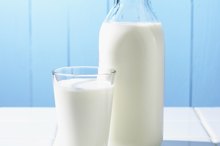Which Enzymes Digest Milk?
Milk is a nutritious food, providing protein, carbohydrates, vitamins, minerals and, possibly, depending on the variety of milk you drink, energy-rich fats. However, macronutrients require digestion to unlock their nutritional benefits. As part of digestion, specific enzymes break down the macronutrients -- that is, the protein, carbohydrates and fats -- in milk so your body can absorb and make use of them.
Protein Digestion
One cup of milk supplies 8 grams of protein, according to the Dairy Council of California. Proteins are large molecules too big for the small intestine to absorb; your body must break them down into their constituent amino acid building blocks for absorption. A number of digestive enzymes, known collectively as proteases, accomplish this task. Some proteases are exopeptidases that break off amino acids from either end of the protein molecule, while others – the endopeptidases – work in the middle portion of the protein. Together these enzymes clip off individual amino acids to create a pool of free amino acids ready for absorption by the cells of the small intestine.
Carbohydrate Digestion
What Effects Does Lactose Have on the Human Body?
Learn More
Lactose, or milk sugar, is the carbohydrate naturally found in milk. This sugar is a disaccharide, or a double-unit sugar made up of two smaller sugars bonded together. Because your intestinal cells can absorb only the smaller monosaccharides, lactose must undergo digestion by the enzyme lactase. Once lactase breaks down the milk sugar into single sugar units, the absorptive cells of the small intestine carry them to the bloodstream. Some types of milk – chocolate milk, for instance – contain additional sugar in the form of sucrose. Similar to lactose, the disaccharide sucrose requires digestion prior to absorption, in this case by the enzyme sucrase.
Fat Digestion
Different types of milk contain different amounts of fat. Fat-free, or skim, milk adds no fat to your diet, while whole milk provides nearly a gram for every ounce you drink, states the Dairy Council of California. Any fats, or lipids, in the milk you drink need to be digested with the aid of an enzyme called lipase. This digestive enzyme breaks down fat molecules into monoglycerides and free fatty acids. As with amino acids and monosaccharides, monoglycerides and fatty acids are small enough to undergo absorption by your small intestine.
Considerations
Macromolecules in the Human Digestive System
Learn More
Any disorder that affects your body’s ability to manufacture digestive enzymes can reduce the nutritional benefit of the foods, such as milk, you eat. For example, Dr. Peter King of Francis Marion University says that, worldwide, up to 50 percent of people manufacture insufficient lactase to digest the carbohydrate in milk. Known as lactose intolerance, this disorder prevents you from extracting the energy available in milk sugar and can cause unpleasant digestive upset. Adding lactase supplements to your diet or drinking lactase-treated milk allows you to benefit from milk’s rich nutrients without causing uncomfortable digestive symptoms.
Related Articles
References
Writer Bio
A writer since 1985, Jan Annigan is published in "Plant Physiology," "Proceedings of the National Academy of Sciences," "Journal of Biological Chemistry" and on various websites. She holds a sports medicine and human performance certificate from the University of Washington, as well as a Bachelor of Science in animal sciences from Purdue University.









